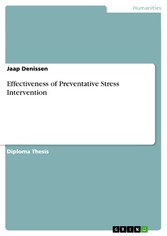Search and Find
Service
Effectiveness of Preventative Stress Intervention
Diploma Thesis from the year 2001 in the subject Psychology - Work, Business, Organisation, grade: very good, Radboud Universiteit Nijmegen (Prevention Research Centre), language: English, abstract: Abstract The present study is a review of the effectiveness of preventive stress interventions. First of all, it was tried to determine the effect size of a sample of such interventions. Secondly, it was assessed whether this sample was homogeneous. As a third objective, it was tried to identify some of the working factors, or effect predictors, of the stress interventions. It was hypothesised that the following characteristics would be positively related to effect: carrying out the intervention after working hours, a high-risk target group, an on site intervention location, a longer intervention duration and the use of multiple methods. Furthermore, a differential effectiveness on the basis of intervention method was expected. Organisational interventions were expected to be equally effective as worker-oriented ones. At follow-up, organisational interventions were expected to increase in effect relative to worker-oriented ones. Finally, it was expected that the quality of the intervention design would be effect-related. As an additional factor, the effect of publication year was assessed. In order to address the research questions, a meta-analysis was carried out. Through an extensive literature search, 47 evaluation studies were retrieved. These articles were coded using a specialised coding system. On the basis of their outcomes, a standardised measure of effect size was calculated. Results showed a medium intervention effect on psychological outcomes. Small effects were found for behavioural outcomes, whereas the effect for cognitive, physiological and organisational measures was very small to zero effects. Due to 5 outlier studies, the sample was heterogeneous. As expected, after work hours programs were (marginally) more effective. Moreover, the quality of the interventions design was positively related to effect. Contrary to the expectations, results indicated that individual-oriented and off site programs were more effective. Finally, publication year was negatively related to effect. The other results were non-significant. The statistical conclusions were supplemented by a qualitative analysis. This largely confirmed the quantitative findings and suggested a number of additional factors that appear effect-related. At the end of the study, suggestions for further research are given.
All prices incl. VAT














